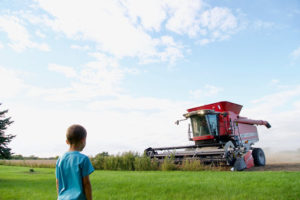The Canadian Federation of Agriculture recently estimated that upwards of $50 billion in farm assets will be transferred over the next decade. Yet, according to Statistics Canada up to 92 percent of farms have no transition or succession in place.
There are many reasons why farmers may not have a succession plan. In some cases, there may not be a family member to transition the farm to, or in other cases, it is difficult to discuss and the farmer delays making any decisions. Failing to plan often leaves the next generation in a difficult situation and puts the future of the farm at risk. Even without a family member to transition the farm to, farmers nearing retirement should plan to ensure their retirement is secure and they minimize any tax consequences.
This article will help to answer common questions about the best way to transfer the family farm to another member of the family.
Keeping the Farm in the Family
Farming is a big commitment and families who grow up on a farm often come to appreciate and love all that the lifestyle and career has to offer. So it makes sense that many farmers want to transfer the farm to their family when the time is right.
Tax breaks are rare when it comes to property, but the good news is that there are some Canadian tax rules that allow the transfer of qualified farm property to family members on a tax-deferred basis. The other piece of good news is that you may able to use your capital gain exemption of $1,000,000 when you transfer farm property to a family member.
There are two caveats to consider for the tax rules in this article to apply:
- Family is defined as a son, daughter, spouse, sibling, aunt, uncle, grandparent, cousin, grandchild, daughter-in-law or son-on-law.
- The farm must meet the government’s definition of a farm: tillage of the soil, breeding, raising or grazing of livestock of all kinds, raising poultry and production of poultry products, fur farming, dairy farming, fruit growing, growing food for human consumption or for feeding livestock, or bee keeping.
Let’s look deeper into the farm transfer tax implications for two scenarios: 1) transfer to a spouse, and 2) transfer to a child.
Farm Transfer Tax Implications
Transferring the Farm to a Spouse
If a farmer chooses to transfer farm ownership to a spouse for any reason, they can do so at one of three values at any time on a tax-deferred basis and avoid paying land transfer tax:
- Adjusted cost base (ACB), the cost of a property plus any expenses to acquire it, such as commissions and legal fees;
- Fair market value (FMV); or
- Undepreciated capital cost (UCC), in the case of depreciable property.
The real benefit here is that there will be no immediate tax implications to either the spouse or the farmer at the time of the transfer. This will defer the taxes payable on any capital gain and recapture of Capital Cost Allowance (CCA) until the spouse sells the property. The type of farm property that qualifies for this transfer includes land, buildings, machinery, shares of a family farm corporation and an interest in a family farm partnership.
Transfer the Farm to a Child
Continuing the family legacy of farming is common in Canada and many farmers choose to transfer the farm to their child when the time is right. Although the process is quite similar to transferring the farm to a spouse, there are some differences to note and different tax implications.
First, we must note that a ‘child’, or ‘children’ includes children, adopted children, stepchildren, grandchildren, great grandchildren and children-in-law. Using this transfer, a farmer can defer the taxes payable on the capital gain and recapture of CCA until the child or children sell the property.
Unlike the transfer of farm property to a spouse, a farmer may be able to transfer qualified farm property to a child or children at a value between its ACB and FMV. The amount the parent (farmer) will transfer the property at will depend partly on whether he or she has enough capital gains exemption room available to offset the gain on the land. As mentioned earlier, farmers are entitled to a $1,000,000 exemption and depending on the value of the land, the sale can be structured to take place at fair market value with the full gain being offset by the parent’s exemption. It’s also worth noting that although land received by a child at FMV will have a higher cost base, it will help reduce the child’s future capital gains liability.
One final point about taxes when transferring farmland to either a spouse or a child is the land transfer tax exemption. Ordinarily, a transfer of farmed land would be subject to land transfer tax if it’s being transferred to a third party. However, under the regulations in the Land Transfer Tax Act, certain transfers of farmed land between family members may qualify for an exemption from land transfer tax. There are conditions for the exemption to apply, both before the transfer and after the transfer. These are based on the type of farm and who it is being transferred to.
Working with a Lerners Agricultural Lawyer
There are many options to consider when transferring a farm to family. If you’re ready to start the process, we can provide guidance on the best solution for your situation and build the legal documents for the transfer.
At Lerners LLP, our Agricultural Law Group can help clients with all aspects of agricultural law, from sales to leasing to succession planning and wills. For more information, please contact us at: 519-672-4510.
References:
*2016 Canadian Census data
https://www.rbcroyalbank.com/business/pdf/Transferring_your_farm_to_family_EN.pdf
https://www.fin.gov.on.ca/en/tax/ltt/ffe.html








